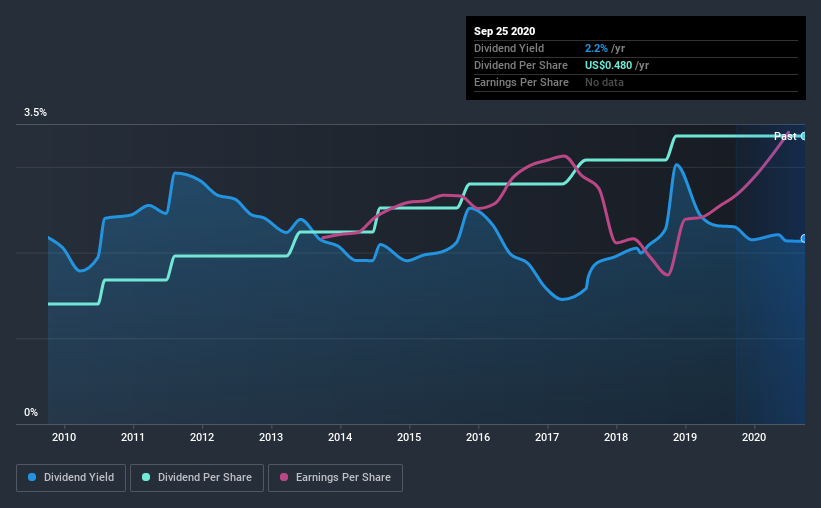Acme United (NYSEMKT:ACU) Could Be A Buy For Its Upcoming Dividend

Regular readers will know that we love our dividends at Simply Wall St, which is why it's exciting to see Acme United Corporation (NYSEMKT:ACU) is about to trade ex-dividend in the next four days. Ex-dividend means that investors that purchase the stock on or after the 30th of September will not receive this dividend, which will be paid on the 22nd of October.
Acme United's next dividend payment will be US$0.12 per share, on the back of last year when the company paid a total of US$0.48 to shareholders. Based on the last year's worth of payments, Acme United has a trailing yield of 2.2% on the current stock price of $22.17. If you buy this business for its dividend, you should have an idea of whether Acme United's dividend is reliable and sustainable. So we need to check whether the dividend payments are covered, and if earnings are growing.
Check out our latest analysis for Acme United
Dividends are typically paid from company earnings. If a company pays more in dividends than it earned in profit, then the dividend could be unsustainable. Acme United has a low and conservative payout ratio of just 25% of its income after tax. Yet cash flow is typically more important than profit for assessing dividend sustainability, so we should always check if the company generated enough cash to afford its dividend. What's good is that dividends were well covered by free cash flow, with the company paying out 17% of its cash flow last year.
It's encouraging to see that the dividend is covered by both profit and cash flow. This generally suggests the dividend is sustainable, as long as earnings don't drop precipitously.
Click here to see how much of its profit Acme United paid out over the last 12 months.
Have Earnings And Dividends Been Growing?
Stocks in companies that generate sustainable earnings growth often make the best dividend prospects, as it is easier to lift the dividend when earnings are rising. If earnings decline and the company is forced to cut its dividend, investors could watch the value of their investment go up in smoke. This is why it's a relief to see Acme United earnings per share are up 5.6% per annum over the last five years. Earnings per share have been increasing steadily and management is reinvesting almost all of the profits back into the business. This is an attractive combination, because when profits are reinvested effectively, growth can compound, with corresponding benefits for earnings and dividends in the future.
The main way most investors will assess a company's dividend prospects is by checking the historical rate of dividend growth. Acme United has delivered an average of 9.1% per year annual increase in its dividend, based on the past 10 years of dividend payments. It's encouraging to see the company lifting dividends while earnings are growing, suggesting at least some corporate interest in rewarding shareholders.
To Sum It Up
Has Acme United got what it takes to maintain its dividend payments? Earnings per share growth has been growing somewhat, and Acme United is paying out less than half its earnings and cash flow as dividends. This is interesting for a few reasons, as it suggests management may be reinvesting heavily in the business, but it also provides room to increase the dividend in time. It might be nice to see earnings growing faster, but Acme United is being conservative with its dividend payouts and could still perform reasonably over the long run. Acme United looks solid on this analysis overall, and we'd definitely consider investigating it more closely.
While it's tempting to invest in Acme United for the dividends alone, you should always be mindful of the risks involved. Our analysis shows 2 warning signs for Acme United and you should be aware of these before buying any shares.
A common investment mistake is buying the first interesting stock you see. Here you can find a list of promising dividend stocks with a greater than 2% yield and an upcoming dividend.
This article by Simply Wall St is general in nature. It does not constitute a recommendation to buy or sell any stock, and does not take account of your objectives, or your financial situation. We aim to bring you long-term focused analysis driven by fundamental data. Note that our analysis may not factor in the latest price-sensitive company announcements or qualitative material. Simply Wall St has no position in any stocks mentioned.
Have feedback on this article? Concerned about the content? Get in touch with us directly. Alternatively, email editorial-team@simplywallst.com.

 Yahoo News
Yahoo News 

